Marina Meira
Lawyer graduated from the Faculty of Law of the University of São Paulo, Master’s student in Scientific Dissemination and Culture from Unicamp, and graduate student in Digital Law from UERJ. General Projects Coordinator of the Data Privacy Brasil Research Association, she also coordinates the project on Accountability and Digital Civil Identity. She was part of […]
Lawyer graduated from the Faculty of Law of the University of São Paulo, Master’s student in Scientific Dissemination and Culture from Unicamp, and graduate student in Digital Law from UERJ. General Projects Coordinator of the Data Privacy Brasil Research Association, she also coordinates the project on Accountability and Digital Civil Identity. She was part of the legal team of the Children and Consumption program of NPO Alana Institute, and of the Brazilian Institute for Consumer Protection – Idec. She is a member of the Committee for the Defense of the Rights of Children and Adolescents of the Brazilian Bar Association/State of São Paulo, where she coordinates the Working Group for the Defense of Children and Adolescents in the Digital Environment.
Veja também
-
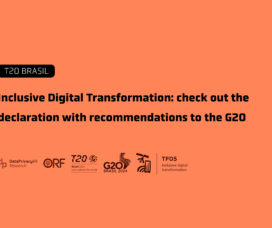
Inclusive Digital Transformation: check out the declaration with recommendations to the G20
In the document, six priorities were defined to deal with issues such as digital inclusion and meaningful universal connectivity; and challenges, opportunities and governance of artificial intelligence.
-
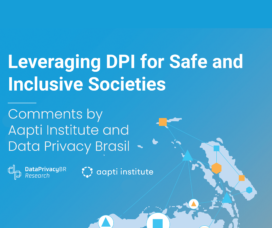
Leveraging DPI for Safe and Inclusive Societies
Aapti and Data Privacy Brasil have submitted their contribution to the Office of the United Nations Secretary-General's Envoy on Technology (OSET) and the United Nations Development Programme (UNDP) regarding the report "Leveraging DPI for Safe and Inclusive Societies".
-
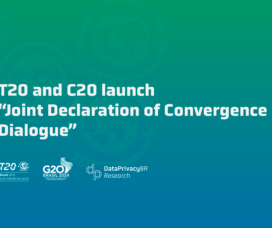
T20 and C20 launch “Joint Declaration of Convergence Dialogue”
On the 2nd and 3rd of July, a Mid-Term Conference took place in Rio de Janeiro, a T20 event with the participation of leaders from national and international think tanks, members of academia, representatives of the private and public sectors and civil society to discuss and propose solutions to the main global challenges.
-
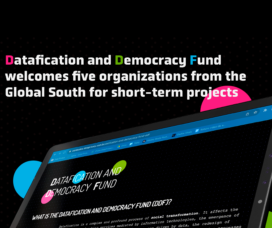
Datafication and Democracy Fund welcomes five organizations from the Global South for short-term projects
The Datafication and Democracy Fund Committee, composed of Data Privacy Brasil, Paradigm Initiative, and Aapti Institute, is pleased to announce the five organizations awarded funding for a short-term research project.
-
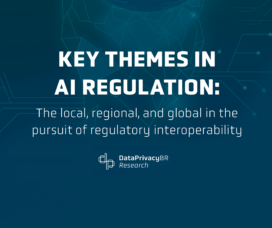
Key Themes in AI Regulation: The local, regional, and global in the pursuit of regulatory interoperability
Data Privacy Brasil releases its report “KeyThemes in AI Regulation: The local, regional, and global in the pursuit of regulatory interoperability,” supported by the Heinrich Böll Foundation. This work is the result of months of research under the project “Where the SabIA Sings: Governance and Regulation of Artificial Intelligence from Brazil”.
-
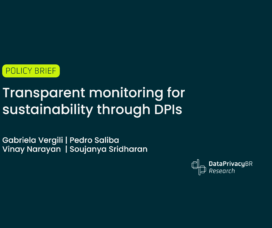
Transparent monitoring for sustainability through DPIs
In this new publication, researchers Gabriela Vergili, Pedro Saliba from Data Privacy Brasil, Vinay Narayan and Soujanya Sridharan from Aapti Institute, discuss the “Transparent monitoring for sustainability through DPIs”.
-
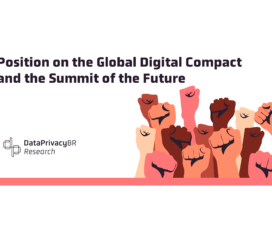
Position on the Global Digital Compact and the Summit of the Future
Between the 9th and 10th of May, the UN Civil Society Conference is happening in Nairobi. The event is presented as an opportunity to engage civil society in preliminary discussions ahead of the Summit of the Future.
-
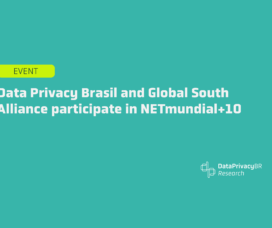
Data Privacy Brasil and Global South Alliance participate in NETmundial+10
Between April 29th and 30th, the NETmundial+10 took place in São Paulo. Building upon the event and the NETmundial Declaration of 2014, this event focused on strengthening global multistakeholder governance for the Internet and digital technologies, as well as conveying messages to global actors for better coordination of various ongoing processes.
Veja Também
-

Inclusive Digital Transformation: check out the declaration with recommendations to the G20
In the document, six priorities were defined to deal with issues such as digital inclusion and meaningful universal connectivity; and challenges, opportunities and governance of artificial intelligence.
-

T20 and C20 launch “Joint Declaration of Convergence Dialogue”
On the 2nd and 3rd of July, a Mid-Term Conference took place in Rio de Janeiro, a T20 event with the participation of leaders from national and international think tanks, members of academia, representatives of the private and public sectors and civil society to discuss and propose solutions to the main global challenges.
-

Datafication and Democracy Fund welcomes five organizations from the Global South for short-term projects
The Datafication and Democracy Fund Committee, composed of Data Privacy Brasil, Paradigm Initiative, and Aapti Institute, is pleased to announce the five organizations awarded funding for a short-term research project.
-

Key Themes in AI Regulation: The local, regional, and global in the pursuit of regulatory interoperability
Data Privacy Brasil releases its report “KeyThemes in AI Regulation: The local, regional, and global in the pursuit of regulatory interoperability,” supported by the Heinrich Böll Foundation. This work is the result of months of research under the project “Where the SabIA Sings: Governance and Regulation of Artificial Intelligence from Brazil”.
-

Transparent monitoring for sustainability through DPIs
In this new publication, researchers Gabriela Vergili, Pedro Saliba from Data Privacy Brasil, Vinay Narayan and Soujanya Sridharan from Aapti Institute, discuss the “Transparent monitoring for sustainability through DPIs”.
-

Position on the Global Digital Compact and the Summit of the Future
Between the 9th and 10th of May, the UN Civil Society Conference is happening in Nairobi. The event is presented as an opportunity to engage civil society in preliminary discussions ahead of the Summit of the Future.
-

Data Privacy Brasil and Global South Alliance participate in NETmundial+10
Between April 29th and 30th, the NETmundial+10 took place in São Paulo. Building upon the event and the NETmundial Declaration of 2014, this event focused on strengthening global multistakeholder governance for the Internet and digital technologies, as well as conveying messages to global actors for better coordination of various ongoing processes.
-
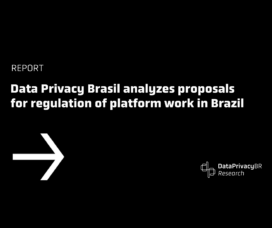
Emerging trends in the regulation of platform work in Brazil: a preliminary report
The new report produced by Data Privacy Brasil provides a brief introduction to the topic, exposing the size and importance of the Brazilian platform market.
-
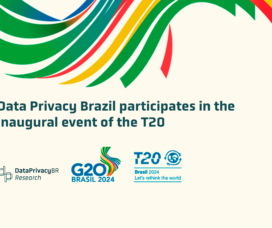
Data Privacy Brazil participates in the inaugural event of the T20
Between March 4th and 6th, the Organizing Committee of T20 Brazil - composed of CEBRI, FUNAG, and IPEA - held the first official event of the engagement group. The event took place entirely virtually and was openly broadcast to the public.
-

Inclusive Digital Transformation in the T20
The year 2024 marks Brazil's presidency in the G20, the group of the world's largest economies, chaired by our country for the first time. It is a year of great opportunity for Brazil to influence a broad global governance agenda, prioritizing issues such as inequality, climate change, and, of course, digital transformations.
-

Privacy, Public Transparency and Climate Change
How transparency and data protection can help environmental public policies in Brazil.
-
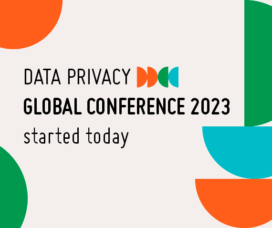
Data Privacy Global Conference 2023 started today
Data Privacy Global Conference, organized by Data Privacy Brasil, started this Monday (November 27th) in São Paulo, at the ESPM School.
-
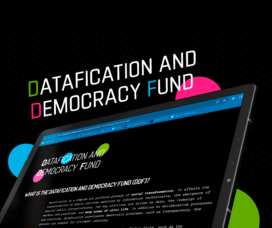
Data Privacy Brasil, Paradigm Initiative and Aapti Institute announce the launch of the “Datafication and Democracy Fund”
The fund aims to finance activities that strengthen the work of NGOs in the Global South on issues of datafication and democracy
-
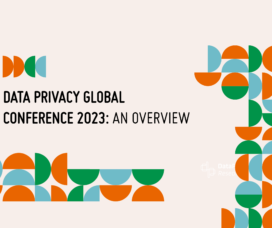
Data Privacy Global Conference 2023: an overview
The second edition of the Data Privacy Global Conference brought together professionals from more than one hundred civil, business and government organizations in a two-day event in the city of São Paulo, between November 27th and 28th, 2023. With more than 20 sponsors, the 2023 DPGC edition was a public success, with more than 250 participants.
-
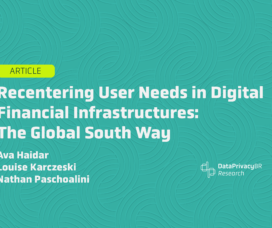
Recentering User Needs in Digital Financial Infrastructures: The Global South Way
Through India’s G20 leadership in 2023, global agendas of digital transformation and financial growth have come to be intimately reoriented to challenges, priorities and special developments in the Global South.
-

At UNCTAD eWeek, Data Privacy Brasil will discuss the intersection between digital economy and human rights in AI regulation
The UNCTAD eWeek, an initiative of the United Nations Conference on Trade and Development (UNCTAD) in partnership with eTrade for all, will occur from the 4th until the 8th of December.
-
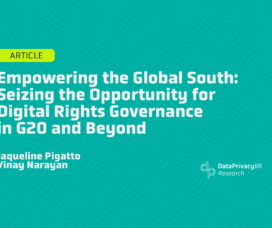
Empowering the Global South: Seizing the Opportunity for Digital Rights Governance in G20 and Beyond
The G20 represents a critical policy space for addressing emergent challenges on a global scale and its importance as a platform is pronounced when we consider its significance for the Global South.
-
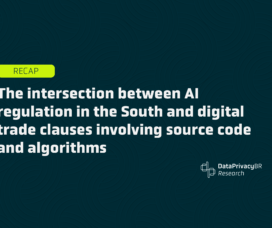
The intersection between AI regulation in the South and digital trade clauses involving source code and algorithms
Recap of Session 43 of the WTO’s 2023 Public Forum organized by Data Privacy Brasil and REBRIP
-
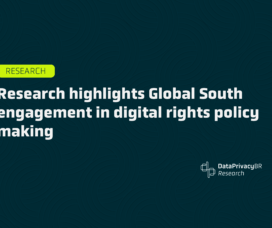
Research highlights Global South engagement in digital rights policy making
The Data Privacy Brasil Research Association announces the launch of the research report on Global South perspectives on international engagement in digital rights.
-

Data Privacy Brazil participates in the 18th edition of the Internet Governance Forum in Japan
Data Privacy Brasil will aim to monitor and contribute to topics such as governance, regulation, accountability, and digital civil identity, giving visibility to the Brazilian scenario and the Global South.
-
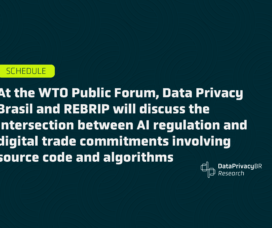
At the WTO Public Forum, Data Privacy Brasil and REBRIP will discuss the intersection between AI regulation and digital trade commitments involving source code and algorithms.
The WTO Public Forum 2023 will take place between September 12th and 15th in Geneva.
-

Job Opening: Digital Librarian
The Data Privacy Brasil makes the notice public with registrations until September 15, 2023.
-
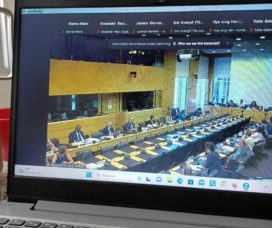
Data Privacy Brasil participates in UN’s OHCHR briefing on Brazil
The organization highlighted how the advance of edtech has been violating children’s privacy in the country
-

Data Privacy Brasil’s contribution to the Thematic Deep Dive of Artificial Intelligence and other Emerging Technologies of the Global Digital Compact
As other civil society organizations already pointed out, notable preference was given to the speech of Member States, UN agencies, and the private sector, at the expense of human rights civil society organizations, which prevented the speech that had been prepared by the DBPR and other civil society stakeholders.
-

Data Privacy Brasil contributes to the Thematic Deep Dive in Data Protection (Global Digital Compact)
Data Privacy Brasil participated in the Thematic Deep Dive Session in Data Protection, organized by the co-facilitators ambassadors of the Global Digital Compact.
-
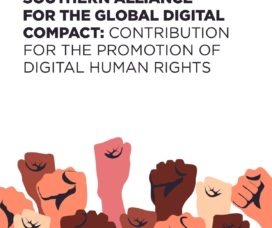
Southern Alliance for the Global Digital Compact
Responding to the call made by the United Nations, the Data Privacy Brazil Research Association, together with organizations from the Global South, presents a contribution to the Global Digital Compact.
-
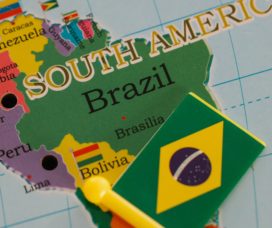
Data Privacy Brasil Research Association contributes to UN open call on the relationship between human rights and technical standard-setting processes
We received a call as an opportunity to submit suggestions to inform the OHCHR report on the relationship between human rights and standard-setting processes for new and emerging digital technologies.
-
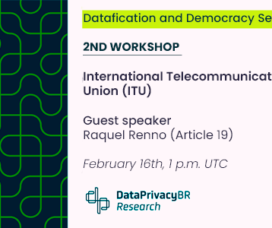
Our second workshop of a series about technical forum talks about the International Telecommunications Union
In the second meeting of the Datafication and Democracy Workshop Series, we received Raquel Renno, Digital Programme Officer of Article 19, who spoke about the International Telecommunication Union (ITU) for third sector organizations.
-
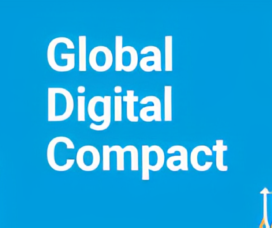
Let’s stay tuned for the Global Digital Compact
What is the Global Digital Compact and why is it important to keep an eye on it?
-

Why should we all pay attention to the Brazilian Digital ID system?
The implementation of digital identity systems is increasing around the world, especially in Global Southern countries. The model widely adopted is known as Big ID, promoted by or linked to public administration bodies which use centralized biometric databases to identify and authenticate citizens (Access Now, 2021).
DataPrivacyBr Research | Content under licensing CC BY-SA 4.0

